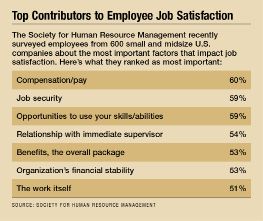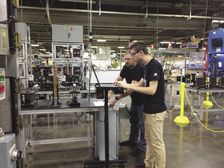Processing Your Payment
Please do not leave this page until complete. This can take a few moments.
- News
-
Editions
View Digital Editions
Biweekly Issues
- April 29, 2024
- April 15, 2024
- April 1, 2024
- March 18, 2024
- March 4, 2024
- February 19, 2024
- February 5, 2024
- January 22, 2024
- January 8, 2024
- + More
Special Editions
- Lists
- Viewpoints
- HBJ Events
- Business Calendar
- Custom Content
Workers rank salary as top motivator for first time since recession
 Image | nito, shutterstock.com
Image | nito, shutterstock.com

For the first time since the Great Recession, employees say compensation is the biggest contributor to job satisfaction, according to a new Society for Human Resource Management (SHRM) survey.
The survey asked participants to rank 35 different contributors to job satisfaction and 60 percent of respondent's ranked compensation/pay as their No. 1 priority. Job security and opportunities to use skills and abilities tied as the second biggest contributors to job contentment, the survey found.
The results indicate that more workers may not be satisfied simply by having a job, and, as the economy continues to improve, will begin to ask for higher wages to bolster incomes that have grown slowly, or remained stagnant, since the Great Recession, experts say. That will likely increase employer competition for top talent.
“We often see situations where workers are job hopping, thinking they're going to better themselves by taking a job that offers more money,” said Mark Soycher, a human resources attorney for the Connecticut Business & Industry Association.
SHRM's national survey polled 600 randomly selected employees from small and large companies.
Many employees are under financial strain, which made salary all the more important in this year's survey, said Evren Esen, SHRM's director of survey research.
Esen said the survey does not necessarily mean employees will start immediately demanding raises but shows that compensation continues to be an important factor in overall job satisfaction.
“During other economic cycles people may be more focused on benefits and career advancement, but right now our research shows compensation is top of line,” said Esen.
According to the SHRM survey, 56 percent of employees reported receiving a raise in the last year, up 6 percentage points from a year earlier. The survey also found that 63 percent of employees said they were either somewhat satisfied or very satisfied with their pay.
In terms of boosting job satisfaction, Soycher said raises provide only short-term answers; company culture, flexibility, and advancement opportunities are of greater motivational value in the long haul.
Bob Klancko, board member of the New Haven Manufacturers Association, said he agrees that raises have a short-term effect and that other non-financial rewards like personal success, experience, and positive work environments are also key to making employees happy.
The manufacturing industry in Connecticut currently has 9,000 unfilled positions, creating a competitive market for employees. Jerry Clupper, New Haven Manufacturers' executive director, said the reason these jobs are unfilled is the lack of eligible, skilled workers, not poor compensation.
Another recent survey by national staffing agency Robert Half, however, found that 42 percent of American professionals feel they aren't being paid what they are worth. Robert Half puts out a salary guide every year that analyzes roles and responsibilities broken down based on the size of a company and its geographic location.
Jennifer Arenas, Robert Half's regional manager in Hartford, said with compensation as the No. 1 factor in employee satisfaction, retention has been employers' biggest concern, especially as the economy improves and competition for top talent stiffens.
“Retaining top employees is what will let companies grow,” said Arenas. “We're finding more and more that this is becoming an employee market.”
With a bigger demand for workers, Arenas said many companies are becoming open to discussing wage increases, although not all employers are able to give pay hikes right now.
“We've seen a steady increase in salaries over the past few months in order to retain and attract workers,” said Arenas.
To compensate and retain workers, Arenas said, employers are also offering non-financial rewards such as increased vacation time and greater flexibility to work remotely.
“People are doing their homework,” said Arenas. “Workers are determining their worth by utilizing resources that have been more readily available now than in the past few years.”
Related Content

2022 Giving Guide
This special edition informs and connects businesses with nonprofit organizations that are aligned with what they care about. Each nonprofit profile provides a crisp snapshot of the organization’s mission, goals, area of service, giving and volunteer opportunities and board leadership.
Learn more
Subscribe
Hartford Business Journal provides the top coverage of news, trends, data, politics and personalities of the area’s business community. Get the news and information you need from the award-winning writers at HBJ. Don’t miss out - subscribe today.
Subscribe
2024 Book of Lists
Delivering Vital Marketplace Content and Context to Senior Decision Makers Throughout Greater Hartford and the State ... All Year Long!
Read Here-
2022 Giving Guide
This special edition informs and connects businesses with nonprofit organizations that are aligned with what they care about. Each nonprofit profile provides a crisp snapshot of the organization’s mission, goals, area of service, giving and volunteer opportunities and board leadership.
-
Subscribe
Hartford Business Journal provides the top coverage of news, trends, data, politics and personalities of the area’s business community. Get the news and information you need from the award-winning writers at HBJ. Don’t miss out - subscribe today.
-
2024 Book of Lists
Delivering Vital Marketplace Content and Context to Senior Decision Makers Throughout Greater Hartford and the State ... All Year Long!
ABOUT
ADVERTISE
NEW ENGLAND BUSINESS MEDIA SITES
No articles left
Get access now
In order to use this feature, we need some information from you. You can also login or register for a free account.
By clicking submit you are agreeing to our cookie usage and Privacy Policy
Already have an account? Login
Already have an account? Login
Want to create an account? Register
Get access now
In order to use this feature, we need some information from you. You can also login or register for a free account.
By clicking submit you are agreeing to our cookie usage and Privacy Policy
Already have an account? Login
Already have an account? Login
Want to create an account? Register










0 Comments